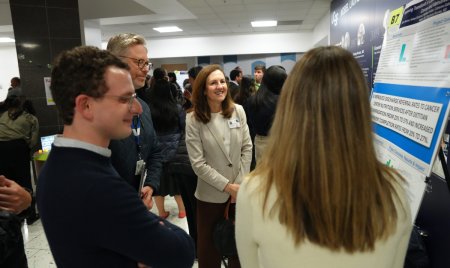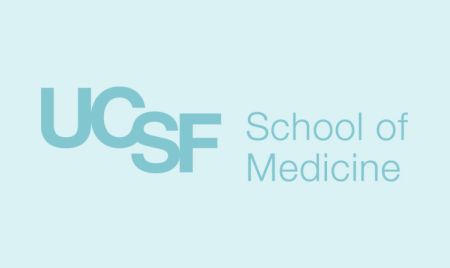UCSF Curriculum Ambassadors Advance Equity Through Research
Five UCSF medical students participating in the Curriculum Ambassador program (CURAM) presented their research projects, focused on enhancing the Bridges Curriculum, during the Summer Explore Symposium in November.
CURAM, launched in 2001, is the hallmark of curricular change and enhancement at UCSF where medical students can play an integral role in shaping the evolution of the School of Medicine curriculum. For more than 20 years, more than 300 students have participated in this funded summer fellowship program and Curriculum Ambassadors, partnered with faculty mentors, have developed more than 250 curriculum projects. Projects through the years have focused on top priority areas for curriculum improvement and innovations, and during the last three years, students partnered with faculty members to design and implement projects that advance the Anti-Oppression Curriculum Initiative (AOCI). This year, four of five students partnered with AOCI faculty mentors to work on projects tied directly to the AOCI and one student partnered with faculty educators to work on an equity-focused project related to professionalism.
Denise Connor, MD, Director of the Anti-Oppression Curriculum Initiative and a CURAM faculty mentor said, “CURAM is a fantastic way for students to explore whether educational scholarship is an area they may want to focus on in their future careers, while contributing to the on-going improvement of the Bridges Curriculum. Students have opportunities to connect with one another through peer mentorship, and work with different faculty members on aspects of educational scholarship—whether that's curriculum design, evaluation, or assessment. The projects students work on have a real impact on the curriculum. Having students as co-designers and co-scholars is so important to curricular efforts both locally and nationally, and CURAM does a lovely job of making that possible.”
Ethan Tanchoco, a 2023 Curriculum Ambassador shared, “One of the best aspects of my experience with CURAM was the ability to get regular feedback and ideas about my project from peers and experts in medical education. It provided a lot of perspective, especially at times when I found myself stuck.”
Learn more about the research of the 2023 CURAM Student Ambassadors:
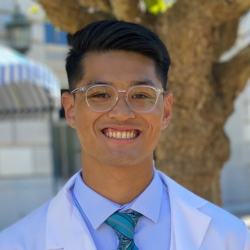
Michael Chichioco, mentored by Susannah Cornes, MD
Disability Advocacy and Representation of Topics related to Disability in Medical Education
Michael’s research interest focuses on disability advocacy and representation of topics related to disability in medical education. His research is influenced by his lived experiences. He shared, “As an individual who identifies as disabled, I have had many lived experiences of navigating the world often feeling different from many of those around me, and encountering a lot of systemic challenges in society that have led to some difficult personal challenges throughout my life. I strive to help make the world a more accommodating and accessible place for all individuals. Specific to health care, I hope that by creating new curriculum on disability and bringing it to the UCSF School of Medicine, we can spread more awareness about disability.”
Michael’s research objective was to build a disability curriculum for pre-clinical medical students that engages community partners to highlight patient perspectives and foster patient-centered care for patients with disabilities. The next steps of his research project include presentation of his work in more research conferences on medical education and continued refinement and development of his curricular session based on feedback from student, faculty, and community partners.
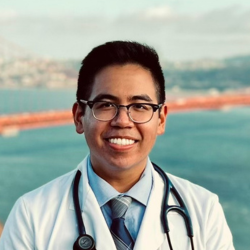
Vincent Grospe, mentored by Karen Hauer, MD, PhD, Daniela Maristany, MD, and Bridget O’Brien, PhD, MS
Diverse Learners’ Experiences with Professionalism Feedback using a Feedback Literacy Framework
Vincent’s research interest centers on medical education and professionalism. He enjoys the learning and collaborative aspects of qualitative research. He said, “It’s fascinating to learn about students’ stories and backgrounds and to notice both similarities and intricacies when reading about how students navigate their experiences. Our research team comes from various stages of training and backgrounds, which gives us well-informed findings that have great potential in informing educational policies and creating a more inclusive learning environment for students.”
Vincent’s research project aim was to explore how diverse learners from three institutions (UCSF, Mayo Clinic, and Morehouse School of Medicine) experience critical and reinforcing professionalism feedback, as well as how they decide whether and how to incorporate this feedback. Vincent presented his findings at the Academy of Professionalism in Health Care and submitted a study manuscript. As next steps of his research, he plans to present at the USC Innovations in Medical Education Conference and submit a small group discussion proposal, focusing on the professionalism experiences of educators, leaders, and trainees.
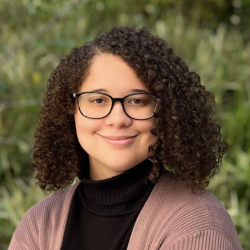
Christina Honoré, mentored by Kala Mehta, DSc, MPH, Denise Connor, MD, and Aimee Medeiros, PhD
Integrating a Disability Justice Framework into UCSF Curriculum
Christina’s research interest focuses on medical education. Christina enjoys how their research discoveries continuously fuel their curiosity. They said, “The more I learn, the more I can ask, and the more I want to learn! In this project, specifically, I was able to deepen my understanding of disability theory, and this led me to become more curious about how the principles apply to a clinical setting.”
Christina’s research project goals were to identify gaps in UCSF's pre-clinical disability education and fill in those identified gaps. The next step for their research project is the development and implementation of a small-group discussion, where students can learn about ableism in medicine, reflect on their own privilege and biases, and brainstorm methods to dismantle ableism within their own practice.
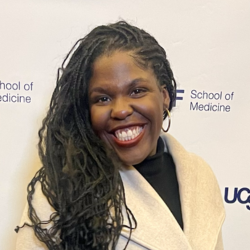
Toluwani Taiwo, mentored by Kanade Shinkai, MD, PhD
Informed Consent Practices for Publication of Patient Images in Dermatology Journals
Toluwani’s research interest centers on dermatology, skin of color, and health equity. Her experience as a post-baccalaureate research fellow at the NIH shaped her research interest, which includes addressing questions that directly enhance patient care. She said, “The enriching teaching environment at UCSF has made delving into challenging research topics more accessible than ever. I take satisfaction in systematically addressing questions, continuously seeking innovative approaches to explore problems, and proposing effective solutions.”
Toluwani’s research examines consent practices in top dermatology journals. For the next steps of her research project, Toluwani will be presenting her work at the American Academy of Dermatology Annual Meeting and will be publishing a research letter summarizing her findings.
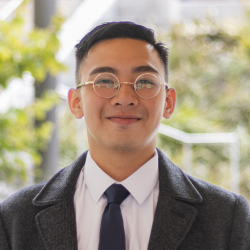
Ethan Tanchoco, mentored by Katherine Lupton, MD
F1 Small Group Facilitator Faculty Development: A Basic Needs Assessment
Ethan’s research interest revolves around medical education, which includes student experience and wellness, student assessment, and visual representation of medical concepts. Ethan enjoys the ability to ask research questions based on his own observations. Ethan shared, “In conducting interviews for the project, I've really enjoyed the process of getting to know the stakeholders and thinking deeply about the new information I gather every time. Throughout, I've felt a lot of agency in moving the project forward and empowered to use my perspective to shape the progress we make.”
For his research project, Ethan conducted a needs assessment to better understand the preparation and skill development challenges of F1 small group facilitators and identify a set of best practices that can inform future faculty development efforts. In alignment with the Anti-Oppressive Curriculum Initiative, his team placed special emphasis on equity in the classroom learning environment. As next steps of his research, Ethan plans a direct collaboration with F1 curriculum leaders and a continued identification of tools that need to be developed to address the challenges he observed.
Are you a current UCSF medical student interested in being a Curriculum Ambassador this summer? Learn more about the CURAM program and apply by March 1, 2024!
